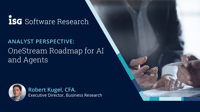OneStream offers a platform designed to serve the needs of accounting and financial planning and analysis (FP&A) organizations. The software handles financial close and consolidation, planning and budgeting, analysis and reporting.
Read More
Topics:
Office of Finance,
Analytics,
Business Planning,
ERP and Continuous Accounting,
digital finance,
Generative AI,
Consolidate and Close Management,
AI and Machine Learning
We live in a time of uncertainty, not unpredictability. Especially when a business finds itself on an undefined journey with an unclear destination—whether caused by internal events or the world at large—having plans to deal with a range of outcomes increases the odds of success. Or, at least enduring the least amount of damage. Managing an organization in uncertain times is always hard, but tools are available to improve the odds of success by making it easier and faster to plan for...
Read More
Topics:
Machine Learning,
Office of Finance,
Supply Chain Planning,
Business Planning,
Supply Chain,
Enterprise Resource Planning,
Artificial intelligence,
digital finance,
Generative AI
I recently attended Kinaxis’ annual user group meeting, Kinexions. The most important theme of the event was the trifecta of artificial intelligence (AI), generative AI (GenAI) and agents. Supply chain planning and execution software are the business software domains that are going to be major beneficiaries of AI and agentic AI automation. However, they also are going to be two of the more difficult to translate from potential to reality. Some of the basics, especially predictive analytics...
Read More
Topics:
Supply Chain Planning,
Business Planning,
Supply Chain,
supply chain management
ISG Research recently announced the results of its Business Planning Buyers Guide for 2025. We rated Board Exemplary and a leader in customer experience and in reliability. Board recently launched two external data offerings that significantly strengthen the capabilities of its planning software. Its Board Foresight is designed to support more effective and potentially more accurate forecasting using predictive models harnessing artificial intelligence (AI). Board Signals makes third-party...
Read More
Topics:
Office of Finance,
Business Planning,
digital finance,
Consolidate and Close Management
The recent recommendation by the European Commission to scale back the scope, granularity and timeline for sustainability reporting represents a sea change in this form of corporate disclosure requirements. If enacted, it will substantially reduce or eliminate the reporting requirements for many enterprises, especially small to midsize establishments, as well as provide more time for compliance. While environmental reporting requirements appear to be easing, some regulatory disclosure...
Read More
Topics:
Operations,
Supply Chain Planning,
Business Planning,
Supply Chain,
Sustainability Management
One of the promised benefits of artificial intelligence (AI), Generative AI (GenAI) and agents is that they can make everyone their own financial and business analyst. It’s true that these technologies can make it possible for everyone to access once hard-to-reach data (with suitable permissions), unleash agents to assemble the data into useful tables and charts along with commentary describing results and highlighting underlying drivers of results, propose next best actions and use natural...
Read More
Topics:
Office of Finance,
Business Planning,
ERP and Continuous Accounting,
AI,
AI and Machine Learning
While headlines tend to focus on flashier topics, arguably the biggest business impact from technology advances over the past two decades has been on helping midsize enterprises improve their performance. These organizations have the same requirements as larger ones but have fewer resources to address those needs. Prophix has been at the forefront of using technology innovation to close that gap throughout this period. Its latest advances include Prophix One, introduced last year, and FP&A...
Read More
Topics:
Office of Finance,
Business Planning
In anticipation of conditions that suggested accelerating price increases, I wrote in 2021 about how technology could be useful in an inflationary period, anticipating the world we live in now. Responding effectively to changes in costs is always challenging, but even more so because of the choppy and chaotic nature of the current environment. Inflation may have abated from its highs throughout the rich world but is still an important factor in business decisions. Many enterprises have limited...
Read More
Topics:
Office of Finance,
Business Planning,
ERP and Continuous Accounting,
Subscription Management
I recently completed the latest edition of our Business Planning Buyers Guide, which reviews and assesses the offerings of 14 providers of this software. One of the points that I look at is whether and to what extent the software provider offers out-of-the-box external data useful for forecasting, planning, analysis and evaluation. What I discovered is that the availability of this type of vital information is exceedingly slim.
Read More
Topics:
Office of Finance,
Analytics,
Business Planning,
AI and Machine Learning
When considered at all, unintended consequences are expected to be negative. As enterprises and institutions rush to adopt artificial intelligence and generative AI, the focus is on the potentially unforeseen—and unforecastable—unfavorable outcomes. However, one very likely positive impact of AI investments in business computing is the near-effortless availability of consistently reliable data for whatever task is at hand. This is coming about because of the need to have large, relevant data...
Read More
Topics:
Office of Finance,
Analytics,
Business Planning




















